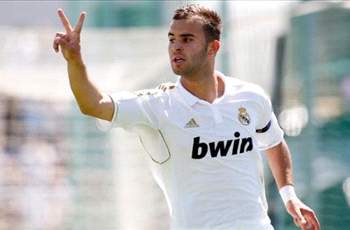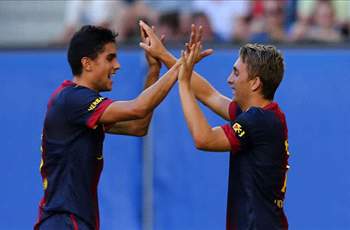ANALYSIS
By Ben Hayward | Spanish Football Writer
There are lies, damned lies, and statistics, wrote Mark Twain. He wasn’t talking about Jose Mourinho, but he might have been. The Real Madrid coach claimed this week to be the “champion of the cantera” and after reeling off a list of the homegrown players who made their debuts between 1999 and 2003 (when Vicente del Bosque was in charge), the Portuguese told the press he had given 26 youngsters their opportunities in the first team. But it was only a half-truth.
When Jose Rodriguez made his first-team debut – and scored – in Wednesday night’s 4-1 win at Alcoyano, he became the 15th Real Madrid youngster (not including Jose Callejon who left and was bought back by Madrid) to graduate under Mourinho in official matches, with the others from the 49-year-old’s list having featured only in friendly games. There had been an element of manipulation in the Portuguese’s claims, but he had only been trying to defend himself from malicious media criticism in recent times.
| CANTERANOS DEBUTED BY MOURINHO |
|||
 |
|||
| Player Alex Antonio Adan Jose Callejon* Jorge Casado Jese Jesus Joselu Jose Rodriguez Juan Carlos David Mateos Tomas Mejias Pedro Mendes Alvaro Morata Nacho Paco Pacheco Pablo Sarabia |
Made debut Mar 6, 2011 Dec 8, 2010 Aug 14, 2011 Dec 20, 2011 Dec 12, 2011 May 21, 2011 May 21, 2011 Oct 31, 2012 Oct 3, 2010 Nov 23, 2010 May 10, 2011 Dec 7, 2011 Dec 12, 2010 Apr 23, 2011 Nov 23, 2010 Dec 8, 2010 |
Total games 1 11 47 1 2 1 2 1 1 2 1 1 6 4 1 1 |
|
| Key: Bold – Still at club * – Returning stars |
|||
Mourinho has come under the spotlight for failing to place faith in the club’s youngsters. Despite missing three full-backs – Marcelo, Fabio Coentrao and Alvaro Arbeloa, through injury – the former Inter boss opted instead to field midfielder Michael Essien on the left, which had disastrous consequences in the 2-1 Champions League defeat at Borussia Dortmund recently.
Mourinho, of course, is being judged on results and is perfectly within his right to pick the players he sees fit – the ones he believes are the most likely to bring home the three points. But the Portuguese has history, having neglected young players at Chelsea and Nerazzurri in favour of well-established stars.
The 49-year-old, of course, can point to his titles and his trophies. Those results speak for themselves. However, having signed a long-term deal at Madrid, it may now be time for the Portuguese to look at a two-tier project: signing the best players in the world, but also blooding youngsters. With many of Madrid’s games ending in comprehensive victories, there would be no harm in introducing a young player in the final stages.
They have to be good enough, though, and Mourinho cannot be blamed if Madrid’s canteranos are not up to scratch. Good games for Castilla, the club’s B side, are no guarantee of first-team success, while the coach has complained that B-team players are either too old or operate in positions which do not exist in his own XI. Nevertheless, observers hope players will not be allowed to slip through the net as has happened too often in the recent past. Juan Mata, Roberto Soldado and Alvaro Negredo are notable examples, although perhaps only the former would be likely to challenge for a first-team place at the Santiago Bernabeu.
Perhaps the real problem for Madrid is the constant comparison with Barcelona. The Catalan club currently possess the finest group of homegrown players in their history, but football is cyclic and after Xavi, Andres Iniesta and Lionel Messi, the conveyor belt of talent may not be able to keep producing at the same level.
Barcelona’s success, however, is the fruit of hard work and dedication. When Johan Cruyff left Camp Nou as a player in 1978, he told the club they must match Madrid by building an Ajax-style academy.
It took time, but in the early 1990s, following another period of Madrid monopolisation (with the Quinta del Buitre between 1986 and 1990), Barca came of age under Cruyff himself, winning four Liga titles on the trot to punch above their weight and match the capital club over a sustained period for perhaps the first time in their history. And all because, as Pep Guardiola later admitted, the club had taken heed during the late 80s, when it was Madrid’s homegrown heroes dominating the scene, not Barca’s.
| CANTERANOS DEBUTED BY PEP/TITO |
|||
 |
|||
| Player Abraham Gai Assulin Marc Bartra Albert Botia Sergio Busquets Isaac Cuenca Gerard Deulofeu Cesc Fabregas* Andreu Fontas Sergi Gomez Jonathan Ruben Mino Martin Montoya Marc Muniesa Nolito Gerard Pique* Rafinha Marti Riverola Sergio Roberto Oriol Romeu Jonathan Soriano Cristian Tello Thiago Xavi Torres |
Made debut Oct 10, 2008 Oct 28, 2009 Feb 14, 2010 May 30, 2009 Sep 13, 2008 Oct 25, 2011 Oct 29, 2011 Aug 17, 2011 Aug 31, 2009 Aug 14, 2010 Oct 28, 2009 Aug 14, 2010 Jan 12, 2012 May 23, 2009 Oct 3, 2010 Aug 13, 2008 Nov 9, 2011 Dec 7, 2011 Nov 10, 2010 Aug 14, 2010 Oct 28, 2009 Nov 9, 2011 May 17, 2009 May 17, 2009 |
Total games 1 1 11 1 205 30 2 61 16 1 21 1 18 4 5 188 2 1 7 2 1 33 68 2 |
|
| Key: Bold – Still at club * – Returning stars |
|||
Guardiola was one of the first successful products of La Masia and the former club captain continued to respect the tradition during his time in charge at Camp Nou, handing first-team debuts to 22 academy graduates, as well as bringing back Gerard Pique and later Cesc Fabregas from spells in the Premier League to reunite them with their former Cadete colleagues.
And unlike Mourinho’s men, many of the players who made their first-team bows under Pep (with Tito Vilanova as assistant) have gone on to make a significant contribution at the highest level – not just a fleeting cameo.
Pep and Tito were blessed with talented players who have gone on to form the base of the Spanish side which has excelled in international football over the last four years, winning back-to-back European Championship crowns as well as a maiden World Cup in South Africa.
Mourinho will argue that if the players are good enough, they will get their chance, but it seems inexplicable that right-back Dani Carvajal was allowed to march off in the summer to Bayer Leverkusen when the club were looking for a player to compete with Alvaro Arbeloa in that very position.
Carvajal may yet return, just as Pique and Cesc did at Barcelona, but there is a real sense of frustration at Madrid right now when it comes to the young players. Are the players really not good enough? Or is Mourinho’s short-termism harming the future of Madrid when he should now be building a team to compete – as he himself has claimed – for the next 10 years?
The answer lies somewhere in between and while Mourinho once claimed that Barcelona were obsessed by the prospect of winning the Champions League at the Bernabeu (which he put paid to by claiming the title with Inter himself in 2010), it now seems to be Madrid that are preoccupied by the Catalans’ continued success with young players.
So after Barca learned from their fiercest rivals in the 1970s and then again in the 1990s, perhaps it’s now time Real looked in the mirror and reflected on how they can improve their own system. Mourinho included.
Follow Ben Hayward on ![]()